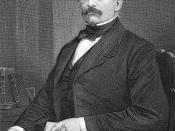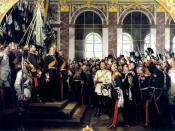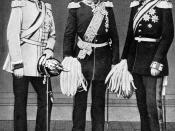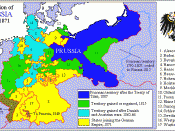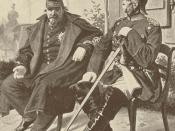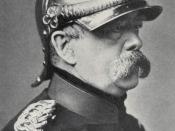After the 1848 revolutions, intellectuals met at the Frankfurt Parliament however they were unsuccessful in achieving the unification of Germany. Reed Brett believes that this failure was caused by the impracticality of popular leaders who were unable to enforce their plans and also by the ongoing rivalry between Austria and Prussia, which prevented either state from becoming the leader of a unified Germany. It was realized that if this rivalry was to continue, the unification of Germany would be impossible. It was highly unlikely that Austria would be in favour of German unity and as a result, the only way it would be possible was to have Austria excluded from the union by compulsion. When Otto von Bismarck rose to power, this was his primary aim. He was able to successfully drive Austria out of German affairs and to achieve a German Empire. It is true that Bismarck believed in the inevitable unification of Germany but only under the terms that Prussia would be its leader.
His main regard was for Prussia and it can be assessed that he desired the unification of Germany only because it would increase the power and influence of Prussia.
BismarckÃÂs young adulthood played a decisive role in determining the authoritative, powerful leader he would someday turn out to be. Stuart Miller states that Bismarck had a Junker upbringing. He served in the Prussian army and civil service, and managed extensive family estates in Pomerania and Brandenburg. He was rather resentful towards authority although he was an authoritarian. Later on, in the 1850s he served as a representative at the Federal Diet. He quickly became anti-Austrian. By that time Austria was claiming superiority in Germany which she no longer had in reality. By 1856, Bismarck was a radical advocate of a Prussian-dominated ÃÂKleindeutschlandÃÂ.
BismarckÃÂs introduction was sudden and unpredicted. In October 1858, Prince Wilhelm was appointed as regent as a result of Friedrich WilhelmÃÂs mental illness. Wilhelm believed that the army of Prussia was necessary to strengthen the prestige and power of Prussia among the German states. He worked with von Roon, the minister of war and von Moltke, the chief of the general staff, to produce a new basis for the Prussian army. They decided that each citizen would be obliged to serve three years with the colours and the reserve was expanded, in which each citizen was to serve two years at the expense of the militia. However, this could not be passed without the opposition and in 1861, the middle-class Progressive Party, as stipulated by Stuart Miller, was founded to fight the army and the Junker class. It was liberal and nationalist and therefore it won the Landtag elections. It opposed WilhelmÃÂs proposals of doubling the army and reducing the role of the Landwehr (which was composed of mainly non-aristocratic officers). They feared compulsory military service because they thought that the government would use it to inculcate obedience to the monarchy and make the old-fashioned military circle in Prussia stronger.
A problem was created as the parliament had more control than the executive. According to Derrick Murphy et al, Roon was not only fighting a technical battle, but a class struggle as well. By 1862, the dispute had already gone on for two years. The assembly became enraged and alienated when the government made temporary grants of money to the army. They rejected the budget and left Wilhelm in despair, considering abdication. As a result, Wilhelm desperately summoned Otto von Bismarck, who was associated with Prussian politics and was the ambassador to Paris at the time.
Bismarck was called to office because of the deadlock between Wilhelm and the liberal Landtag and on the 23rd of September 1862 he became WilhelmÃÂs chief minister. According to Reed Brett, from that day he dedicated himself without reserve to the service of Wilhelm and of Prussia. Jackson J. Spielvogel states that in 1862 Bismarck resubmitted the Army Appropriations Bill to parliament along with an emotional appeal to the liberals. In his appeal he stated ÃÂGermany does not look to PrussiaÃÂs liberalism but to her powerÃÂ Not by speeches and majorities will the great questions of the day be decided but by blood and ironÃÂ. Again, the liberals rejected the bill. Although the liberals were opposed, he continued, collected taxes and reorganized the army. He often blamed the liberals for the collapse of the constitutional government. Bismarck realised that the only way to achieve his goal and WilhelmÃÂs was by ignoring the parliament and continuing to govern Prussia. He continued to rule Prussia for five years without any constitutional grants of money. As Reed Brett states ÃÂBismarck was confident of the possibilities of Prussia, and he cared nothing if, while these possibilities were being realized, he was the best halted man in the countryÃÂ pg151. His policy from the beginning was that Prussia was to have total power over Germany not by reliance on the people. This could only be achieved with the decline of Austria. Bismarck cleverly developed a scheme by which he planned to achieve his goal (expelling Austria). The first was to develop the Prussian army until it was strong enough to defeat Austria. Afterwards, the German confederation was to be dissolved so that Austria would be expelled from Germany. Lastly, a new United Germany would be established with Prussia at its head. He proceeded to achieve this goal in a series of three wars; The Schleswig-Holstein War, the Austro-Prussian War and the Franco-Prussian War.
Schleswig and Holstein were two Duchies on the borders of Germany and Denmark. The Duke of both of them was the King of Denmark. Schleswig was predominantly Danish whereas Holstein had a substantial German majority and was also a member of the German confederation. They were still not considered Danish territories and although they were subject to the King of Denmark, they still had a large amount of legal and administrative independence. The Danes wanted the Duchies to become the possessions of Denmark whereas the Germans wanted them to become part of the German States. By the middle of the 19th century, the King of Denmark Frederick VII, was the last representative of the direct line of the House of Oldenburg. When he became king he tried to issue a constitution to incorporate the two Duchies into Denmark. The Germans fiercely opposed and there was fighting on and off from 1848 until 1852. Those who opposed demanded independence of the Duchies under the leadership of Frederick of Augustenburg, who should have been the next claimant of Schleswig and Holstein because of the customary rule of succession. The powers decided to interfere and proposed a settlement. According to Reed Brett, this settlement was concluded in the Treaty of London in 1852 and it was decided that Frederick VII, following his death, would be succeeded by Prince Christian of Glücksburg instead of Frederick of Augustenburg. Brett believes that if Denmark had been content to abide by the terms of the Treaty there would have been no further trouble. However, the Danes desired to take advantage of their victory.
In 1855, Frederick VII issued another constitution to annex the two Duchies. Holstein, with support from Prussia protested so forcefully that Denmark had no choice but to release her from the constitution and grant it self-government. Frederick died in 1863 and when his successor King Christian came into power, he tried to confirm the recently issued constitution. According to Hajo Holborn, this was clearly a violation of the Treaty of London. Frederick of Augustenburg wasted no time claiming this. He claimed the two Duchies and Denmark. The Germans of the Duchies supported him and so did the Diet of the German Confederation.
At the end of the year, federal troops entered the Duchies. Reed Brett states that Bismarck decided to take advantage of this situation because he saw it as an opportunity to further his own schemes. Using the argument that if the policy succeeded it would strengthen the prestige of the Diet, he persuaded Austria to join with Prussia in maintaining the terms of the Treaty of London. The federal troops were removed from the Duchies and were replaced by a merged army of Austrians and Prussians. On the 1st of February 1864, they entered Holstein. The Danes were overpowered and unable to properly defend themselves. At the end of April a truce was concluded. The final Treaty was signed in Vienna in October. The Duchies were surrendered to Austria and Prussia who were free to decide how to govern them. Austria believed that Frederick of Augustenburg should be allowed to rule the Duchies however Bismarck refused to recognize him except on the terms that made him the ÃÂpuppetÃÂ of Prussia. At the 1865 Convention of Gastein, a settlement was agreed upon that Schleswig and Holstein were to be held as joint possessions of Austria and Prussia. Prussia was to administer Schleswig and Austria administer Holstein, which was to be included in the Prussian Zollverein. Conflict would arise due to the wide separation of Austria from Holstein which would make them unable to govern properly. Because Holstein was adjacent to Prussia, bad governing would lead to conflict between Austria and Prussia. Many historians believe that Bismarck purposely designed the terms of the Constitution so that he could decide when to create friction between Austria and Prussia.
Bismarck was aware that his goal was beginning to take shape. With a war against Austria in mind, Bismarck made several diplomatic agreements. The first was with France in 1865, to ensure that she remained neutral in the event of a war between Austria and Prussia (in exchange for a German territory). The second was with Italy in 1866. They secretly agreed to side with Prussia only under the condition that the war began within three months and that Italy would receive Venetia. In addition, he hoped that his friendship with Tsar Alexander the II would keep Russia neutral.
Now, Bismarck urgently needed to find an excuse to go to war with Austria that would not turn the other powers against Prussia and would include the other members of the German Confederation. Fortunately for him, Austria made a decision which gave him a reason to start a war. Austria favoured one of Frederick of AugustenburgÃÂs policies for the Duchies and was allowing a mass meeting. In addition, Austria did not want Prussia to interfere with the affairs in Holstein and from then on, it became easy to create friction until a war became imminent. Reed Brett believes that the dispute finally arose out of BismarckÃÂs suggestion for a reconstruction of the Constitution of Germany. In June 1866 he proposed for the present Confederation to be abolished. He wanted a new Assembly elected by manhood suffrage to frame the new Constitution. His idea was for Germany to be divided into two sections; a group of northern States led by Prussia and a group of southern States led by Bavaria. This plan totally excluded Austria. Of course, Austria became enraged by this proposal. A Conference was suggested by the Powers and Bismarck agreed however Austria again acted to his benefit by placing strict restrictions. Therefore, the Conference never took place and preparations for war began. Bismarck was at an advantage because Prussia had the latest technology (new breech-loading needle-gun) and a good strategy. Both Austria and Prussia felt confident of a victory. However, AustriaÃÂs overconfidence was soon to be shattered.
This war has been referred to as the Seven Weeks War. It began on the 16th of June when Prussian troops moved into Holstein from which the Austrians were sent away. Although Italy helped with the war, their contribution was of little significance as they were quickly overpowered and killed. Moltke, Roon and Bismarck were able to effectively put their plan into action. Soon, the Prussians occupied Hanover, Saxony and Hesse. On the 28th of June, the army in Hanover was defeated and Hanover was annexed by Prussia. On the 3rd of July, the main armies of Austria and Prussia met at Sadowa in Bohemia. Eventually the Austrians were forced to withdraw and left 24000 men prisoners to Prussia. Austria was defeated in only three weeks. On the 23rd of August 1866, the Treaty of Prague was signed. According to Stuart Miller, Prussia annexed Schleswig-Holstein, Hesse-Cassel, Hanover, Nassau and Frankfurt. Austria paid an indemnity and Italy received Venetia from them. Bismarck was successful in achieving the goal he went to war for (Prussia as the head of a German Confederation and to exclude Austria). However, Bismarck was not too hard on Austria because he realized that there would be an upcoming war with France (He would hope that Austria remain neutral).
BismarckÃÂs Constitution of the North German Confederation was accepted and came into practice on the 1st of July 1867. The King of Prussia was to be the President. Stuart Miller states that the King had the power to conclude treaties, declare war and was commander in chief of the armed forces. The only federal minister was the chancellor and he was responsible only to the president. There were to be two assemblies. The Bundesrat was the Federal Council where there were representatives of the twenty-two member-states. There were forty-three members; seventeen represented Prussia. This was because Prussia needed to control the majority of the votes on the council. The only way to do so was by simply gaining the support of one or two other states. The other assembly of the Confederation was the Reichstag. This consisted of members who were elected from the various states. A system of conscription was also enforced in every member state.
Because France was afraid that the Confederation would become too powerful, the three main southern States of Germany; Bavaria, Würtemberg and Baden were excluded from the Confederation. Bismarck decided that he would not provoke France until his preparations were complete. The states still had the right to make alliances with one another and with the North German States. Bismarck managed to work his way around this. The Southern States were willing to ally with Prussia and use their armies in time of war. As a result, when Prussia went to war, she would have the full support of Germany.
Bismarck was now left to carry out the last stage in his plan to fulfil his goal for Prussia. This was a war against France to make sure that she would not challenge PrussiaÃÂs growing power and secondly, as stipulated by Reed Brett, a war against a common enemy would bring the German states closer together and would open the way for an empire of all Germany. NapoleonÃÂs arrogant and immature behaviour played into BismarckÃÂs hands. France became totally isolated and according to Stuart Miller, much of this was NapoleonÃÂs fault. Napoleon tried to annex Luxemburg and managed to purchase it from William III of Holland. This was seen by the Germans as the French annexation of a German province. This created greater friction between Germany and France.
When Leopold of Hohenzollern (King WilhelmÃÂs relative) succeeded the throne in Spain, France opposed. Napoleon sent his ambassador to demand that he be withdrawn. King Wilhelm withdrew him on the 12th of July however a haughty demand was sent by Napoleon. The Ems Telegramme was evidence of this and Bismarck made sure that it was published in the press. France was humiliated and declared war on the 19th of July 1870.
The Franco-Prussian war began with Prussia at a great advantage. The French had several disadvantages; they lacked organization, ammunition, ambulance arrangements and efficient transport. In contrast to France, Germany had allies; the Southern states, Russia and Austria remained neutral. The war continued until October 1870 when France surrendered.
On the 18th of January 1871, Bismarck fully achieved his goal. The German empire was proclaimed and William I of Prussia became emperor of Germany. Lorraine and Alsace and Lorraine were surrendered to Germany. In May 1871 France paid an indemnity of 200 million pounds.
It is wise to conclude that in order to achieve a unified Germany, Bismarck, from the very beginning knew exactly what needed to be done. By BismarckÃÂs standards, the Unification of Germany was inevitable because he was confident that it would be achieved. With iron and blood, and a few diplomatic agreements, Bismarck was able to successfully maintain the power and prestige of Prussia and complete his plans for a German Empire.
Word Count = 2738Bibliography1.) Brett Reed, Modern Europe 1789-1939, 1961, John Murray, Great Britain2.) Holborn Hajo, A History of Modern Germany, 1969, Alfred A. Knopf Inc, New ÃÂ ÃÂ ÃÂ ..York,(United States of America)3.) Miller Stuart, Mastering Modern European History, 1997, Palgrave, United ÃÂ ÃÂ ÃÂ ..Kingdom, Hampshire4.) Murphy Derrick, Morris Terry, Staton Richard, Waller Sally, Europe 1760-1871, ÃÂ ÃÂ ÃÂ 2000, Harper Collins Publishers LTD, United Kingdom, (England)5.) Spielvogel Jackson, Western Civilization, 2003, Thomson Learning Inc, Belmont, ÃÂ ÃÂ ÃÂ ..California, (United States of America)6.) ÃÂOtto von BismarckÃÂ
